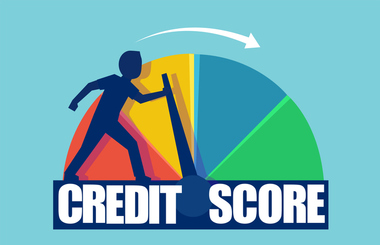If you have a less-than-ideal credit score, you won’t be able to repair it overnight, however there are steps you can take to raise it over time.
Watch your credit card balances
How much revolving credit do you have versus how much you’re using? The smaller the percentage, the better your credit rating. You should shoot for 30 percent or lower. To boost your score, pay down your balances and keep them low. If you have multiple card balances, consolidate them with a balance transfer card or personal loan in order to help your score. See whether the credit card issuer will accept multiple payments throughout the month.
Eliminate credit card balances
A good way to improve your credit score is to eliminate any smaller balances that you have on a number of credit cards. One of the items your score considers is just how many of your cards have balances. So, charging $50 to one card and $30 to another, instead of using the same card, can hurt your credit score. Gather all the credit cards with small balances and pay them off. Select one or two go-to cards, using them for everything.
Leave old debt on your report
Good debt, which is debt that you’ve handled well and paid as agreed, is good for your credit. The longer your history of good debt is, the better it is for your score. Leave old debt and good accounts going as long as possible. Don’t close old accounts where you’ve had a solid repayment record.
Use your calendar
Do rate shopping for a home, car or student loan within a short period. The credit industry will likely realize these are all part of one purchase. Every time you apply for credit, it can cause a small dip in your credit score that lasts a year. When you make multiple applications for credit, it usually means you want to use more credit. Scoring formulas for mortgage, auto and student loans allow for multiple applications, understanding that you’ll take out only one loan.
The FICO score ignores any inquiries made 30 days prior to scoring. If it finds some older than 30 days, it counts those made within a typical shopping period as just one inquiry. The length of the shopping period depends on the credit score used. Lenders using the newest forms of scoring software give you 45 days; older software keeps your rate shopping down to 14 days.
Pay bills on time.
One of the most effective ways towards a good credit score is to simply submit on-time payments month over month. If you’re not good about paying your bills on time, that can damage your credit and hurt your score. Therefore, avoid missing payments, don’t suddenly pay less than you normally do, don’t take cash advances and don’t use your card at a pawn shop or for a divorce attorney.
It is important to remember that improving your credit score is a marathon, not a sprint, and worth the effort.


